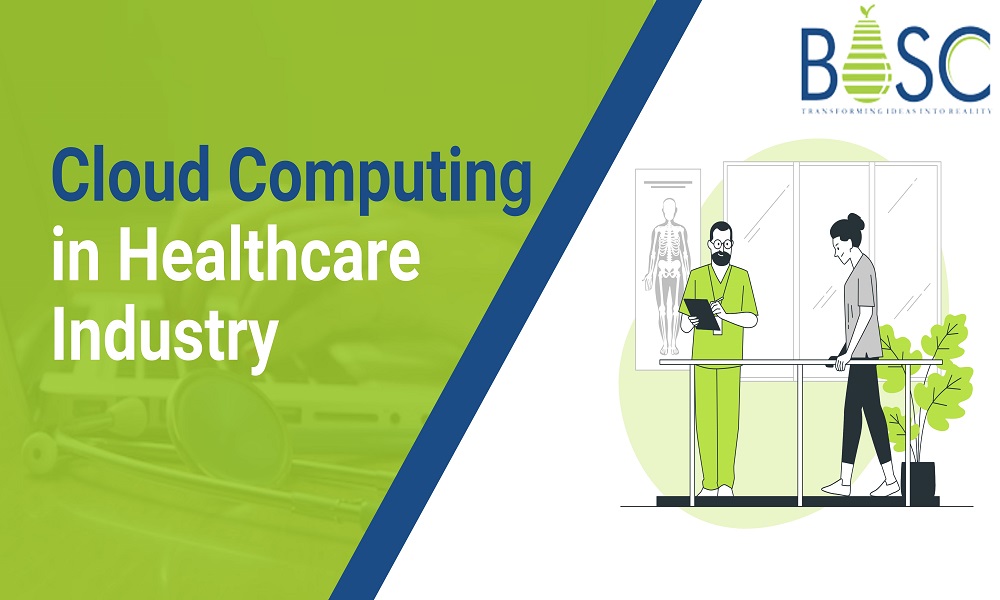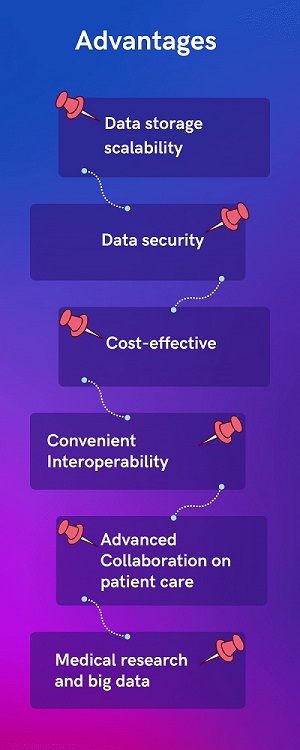
Cloud Computing in Healthcare Industry
There is no doubt that the cloud solution is one of the latest trends that help us improve the world. We are getting new innovative solutions related to our life.
Moreover, when cloud computing is implemented in the healthcare industry, it makes an advanced patient care management system. Cloud computing in the healthcare system will help professionals connect with the remote network, which is accessed by the servers, by breaking down the traditional ways of patient care.
While the healthcare sector was struggling to handle all the medical records and afford the infrastructure costs, it is simple and easy with healthcare cloud computing. Here, in this article, you will find all the information related to an application of cloud service in the medical field that will enhance the existing patient care services. Stay on this to learn more!
What is cloud computing in Healthcare?
Cloud computing develops the shared hardware that is accessed over the network connection, which is helpful for different healthcare app development. It enables the management, storage and processing of medical data. The most extensive application of cloud computing in Healthcare will ease the procedure accessed by an online service that saves a vast amount of data safely and securely. It lessens medical professionals’ efforts to use such services without any technical knowledge.
Moreover, with Electronic Medical Records (EMR), many healthcare organizations have integrated these services. A cloud-based solutions store will keep the patient secure. Additionally, it is optional to shift to the data centres to store your patient and medical data. To scale your healthcare business, adopt cloud-based solutions.
The global healthcare cloud computing market will be approximately US $54,385.9 million in 2022, and it is expected to reach a CAGR of 15.6% between the years 2022 to 2030.
How many types of Cloud Computing are in Healthcare?
If you are planning to move to cloud computing in the medical field, here is some information you should read. The given information sheds light on cloud computing in the healthcare industry.
1. SaaS (Software as a service)
A SaaS provider hires host software for an organization with an annual or monthly subscription. This cloud computing model in the healthcare industry allows the user to access services via an application or web browser. Just like an IT administrator, there is no requirement for a software installation on each workstation.
2. Iaas (Infrastructure as a service)
This model of cloud computing in the medical field gives the on-demand infrastructure that organizations can use through the internet instead of the data centre.
3. PaaS (Platform as a Service)
PaaS gives the IT infrastructure to its developers for creating an entire application lifecycle. For its development, testing, deployment or maintenance, PaaS gives the various servers, networking, components for storage, and many others which have the ready-to-use platform.
4. Private Cloud Computing
This model consists of a healthcare industry with an infrastructure owned by a single person. An owner can make use of these services either externally or in-house. For example, a large-scale firm enhances its security, customizes and computing its power.
5. Public cloud
This model provides the services and technology that all organizations have shared. Scalability is simple in a public cloud due to the availability of the space. Typically, organizations take the help of this service on a pay-per-use basis that is better for the small-scale firm to access these services.
6. Hybrid cloud
It merges the private and public cloud, and the organization gets tailored solutions that permit you to use both platforms without hassle.
What are the pros of Cloud Computing in Healthcare?

1. Data Storage Scalability
The best use of cloud computing applications in Healthcare is data storage. In the medical industry, the data -is driven by massive data, and many hardware installations fail to control it. So, many medical professionals use cloud networks to manage the whole off-site data to eliminate the hassle of maintaining physical servers.
It also enables organizations to address the fluctuating demand of the system. For example, scaling up the storage capacity is easy with healthcare cloud computing systems. The flexibility of using the pay-as-you-go cost structure is the other marvellous functionality. Flexibility gives you the competition to stay ahead by empowering safety and budget.
2. Data Security
With the help of cloud computing, you will get the two most important features: security and reliability. Cloud computing in the healthcare industry is reliable, strengthening security. With this feature facility, executives can move the data and applications which are not controlled. Also, implement HIPAA compliance when using this platform in your business.

The help of cloud computing in the medical field will increase data redundancy and system uptime reliability. Data theft or damage occurs when an unfortunate thing happens, and backup data helps you to access all the previous records.
3. Cost-effective
Cost plays a significant role in deciding to host an application and data. Healthcare organizations bear the cost of 80% of their IT budget to maintain their internal systems. A healthcare company utilizing cloud computing saves hardware costs and capital expenditures. Industry pays for the subscription, which is a fixed amount based on its scale. It helps the company to make use of funds in other operational areas.
4. Convenient Interoperability
Interoperability uses cloud computing in Healthcare and will create data integrations within the healthcare system without relying on a source of data storage. You can access the interoperability with cloud services in the healthcare industry. It helps you to get the information which is more accessible with a flexible distribution to improve healthcare services.
Medical experts can access the patient’s medical data collected from various sources. However, it also utilizes collected data from its primary stakeholders that deliver on-time services.
5. Advanced Collaboration on Patient Care
A cloud network is vital in sharing medical information between healthcare companies. In this way, it is easy to share information. The one who requires access to information can quickly collaborate and get healthcare app development solutions.
By implementing cloud storage, the healthcare industry streamlines the mechanism of gathering data via an EMR, giving collaborative patient care. Cloud-based medical records will ease the viewing and sharing of patient records. In the traditional method, a patient has to carry out a separate medical record of the file whenever they visit the doctor. Still, cloud computing has finished this process with this new technology invention.
6. Medical research and Big data
Adopting cloud computing in the medical sector has created various opportunities for big data. With the application of big data, the world can view and enhance patient care outcomes. Additionally, healthcare cloud computing helps medical researchers to support analytics at a fraction of the cost.
Which issues are associated with cloud computing in Healthcare?
Besides the benefits and healthcare cloud computing offers, there are some risks. Let’s take a look!
1. Restricted Ecosystem
The only acceptance of cloud solutions in Healthcare is that they could make the whole industry more productive and efficient. To achieve many healthcare sectors use Artificial Intelligence, data management and the Internet Of Things.
2. Lack Of experts
You need help finding a healthcare expert in healthcare software that knows to integrate new technologies in this industry. It isn’t elementary to find cloud professionals in the health domain.
3. Security challenges
Storing healthcare data is the central point of adopting cloud technology. But with this, there are also security risks. However, due to its primary cloud setup, a company’s information is shared on the server with the other companies and the remote systems. Sometimes a situation occurs where healthcare agencies need to adopt cloud solutions.
4. Problems in adopting technologies
Moving from a legacy framework to cloud technology, you are required to transform a complete task of the management procedure. Healthcare organizations must teach everyone how it is helpful in everyday tasks.
Which are the examples of applications that use cloud computing in Healthcare?
Many well-known healthcare organizations have started adopting cloud computing in the healthcare management procedure to provide good quality care, reduce operational costs, and improve the overall administration process.
1. MyChart
It is one of the top-most healthcare apps in the USA. It puts your health information in the palm of your hand and will help you conveniently manage the care for your family members and yourself.
2. FollowMyHealth
It helps you to access and manage health information on the go with a mobile version of the universal health record. You can view the test and lab results, communicate with your physicians and much more. It is accessible 24/7.
Conclusion
Integrating cloud computing in Healthcare can change the future in many ways. The cloud solution has many advantages, like reducing the expenses or time to provide convenience and scalability and enhance the collaboration among healthcare experts.
If you hire app developer from the Bosc Tech Labs, then it will help you in developing from scratch and also aids you in overcoming technical issues.
Frequently Asked Questions (FAQs)
1. How will cloud computing affect Healthcare?
Cloud computing in the healthcare industry will increase efficiency and decrease costs. It made the sharing of medical-record easier and safer, automated the backend operations, and allowed the facility to maintain the telehealth apps.
2. What is the cause that the cloud is being used in Healthcare?
It works hand-in-hand with both patients and physicians. It enhances privacy and will give the facility better patient care via collaboration and interoperability.
3. Why Is the Healthcare Sector Moving to Cloud computing?
As it improves patient outcomes, cost-effectiveness is the primary factor that significantly influences a healthcare organization to move to its cloud technology.
Book your appointment now